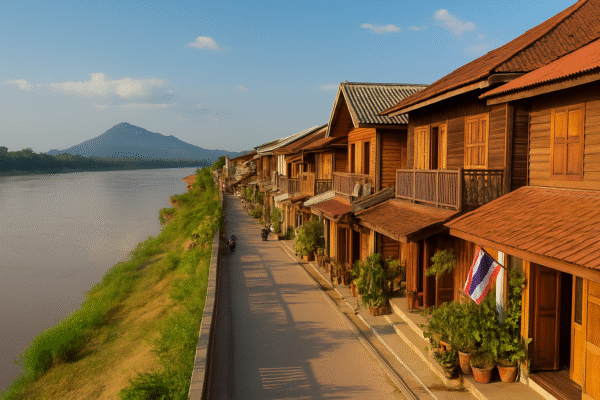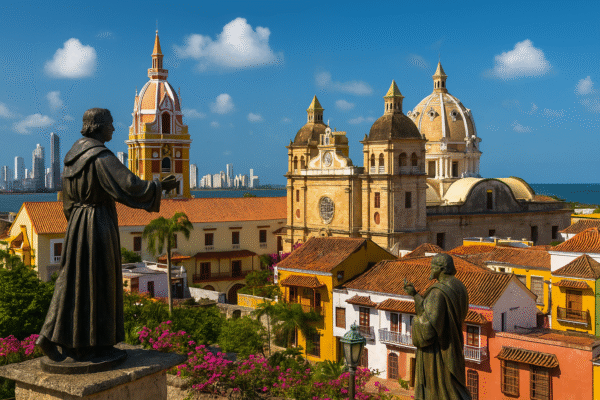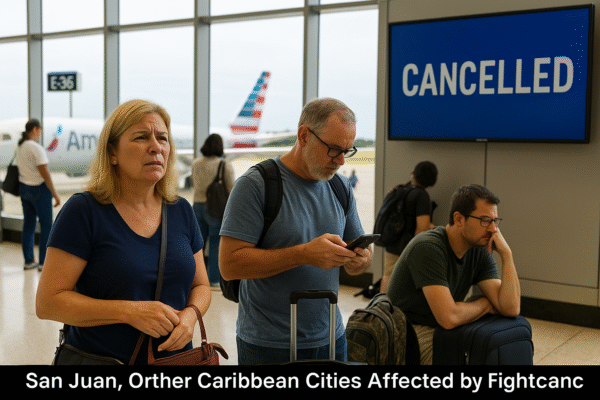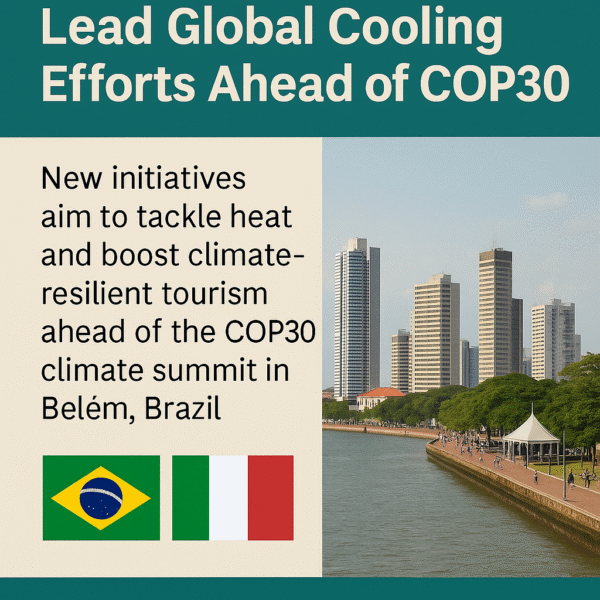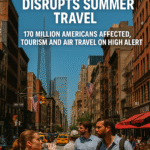With temperatures rising and global tourism infrastructure increasingly vulnerable to extreme heat, Brazil and Italy have jointly stepped up to spearhead sustainable cooling initiatives ahead of the COP30 climate summit in Belém, Brazil. The announcements were made during the Global Cooling Pledge Signatories Focal Points Meeting hosted by the United Nations Environment Programme (UNEP) in Bonn on June 13, 2025.
Brazil unveiled its new national campaign titled “Beat the Heat in Cities / Mutirão contra o Calor Extremo”, aimed at building local resilience to urban heat waves—an issue rapidly becoming one of the biggest threats to global tourism and city infrastructure. Italy followed with a EUR 2 million funding commitment to UNEP’s Global Cooling Pledge (GCP) through its EPIC Facility (Enabling Pledge Implementation for Cooling), which supports countries in translating climate pledges into local action.
These coordinated actions mark a crucial step forward for global travel and urban tourism sectors, as the world contends with three consecutive years of record-breaking heat and anticipates future climate shocks that could cripple urban destinations.
Why Cooling Matters for Cities and the Travel Industry
The tourism economy is increasingly intertwined with climate resilience, especially as cities like Rome, Rio de Janeiro, and New York grapple with heatwaves that disrupt air travel, overheat hospitality infrastructure, and endanger visitor safety.
UNEP’s Global Cooling Watch 2023 warned that if current cooling trends continue unchecked, the sector alone could add 6.1 gigatonnes of CO₂ by 2050. At the same time, over one billion people—including countless travelers—lack access to cooling needed for health, food preservation, and work, especially in urban centers that attract millions of tourists annually.
“Sustainable cooling will be a top priority at COP30 because cities, climate, and billions of people depend on it,” said Ana Toni, CEO of COP30. “Our goal is to turn cities into engines of adaptation and ensure no one is left behind as extreme heat accelerates.”
Brazil’s “Beat the Heat” Campaign Targets Urban Destinations
Brazil’s flagship initiative, “Mutirão contra o Calor Extremo,” is a multi-sector program designed to help cities like São Paulo, Recife, and Belém implement climate-smart cooling strategies that double as tourism-friendly infrastructure upgrades.
Key components of the program include:
- Cool roof programs in hotel and transport hubs
- Nature-based shading solutions in urban tourist zones
- Deployment of public hydration stations and cooling centers
- Urban planning reforms to enhance thermal comfort for both residents and visitors
The move positions Brazil as a leader not only in climate adaptation but also in protecting its domestic and inbound tourism economy, especially in the run-up to COP30.
Italy Backs UNEP’s EPIC Facility with €2 Million
Italy’s commitment of €2 million to UNEP’s EPIC Facility represents one of the first significant funding moves from a developed nation toward implementing the Global Cooling Pledge. The facility provides both technical support and financial acceleration tools for cities and tourism-heavy regions looking to adopt climate-friendly cooling policies.
“Italy is not only advancing its national targets but also supporting international efforts to translate the Global Cooling Pledge into local action,” said Alessandro Guerri, Director General at Italy’s Ministry of Environment and Energy Security.
This initiative is expected to benefit popular Mediterranean destinations like Florence, Naples, and Venice, where heatwaves have historically dampened visitor arrivals, strained hotel capacity, and affected public transport used by tourists.
Tourism at the Center of Climate Adaptation Dialogue
With extreme heat now considered a climate emergency, cities and tourism-dependent economies are quickly realizing that climate adaptation equals tourism preservation.
According to UNEP Climate Change Division Director Martin Krause, “Integrating cooling in new national climate plans—or NDCs—will be critical to ensuring a holistic approach that aligns climate action with economic benefits.”
Cooling strategies are increasingly being incorporated into tourism infrastructure, including:
- Eco-efficient hotel retrofits
- Smart transportation hubs with passive ventilation
- Enhanced coastal zone resilience to accommodate seasonal travel surges
- Green building codes that mandate heat mitigation in tourism zones
The Global Cooling Pledge: A Rapidly Growing Coalition
Launched at COP28 in Dubai in 2023, the Global Cooling Pledge (GCP) is now endorsed by 72 countries and 80 non-state actors, making it the largest collective action plan aimed at reducing emissions tied to cooling systems.
The pledge aims to:
- Cut cooling-related climate impact by 68% by 2050
- Expand equitable access to affordable cooling
- Promote passive design, nature-based solutions, and refrigerant phase-downs
“Cooling is now recognized as a frontline defense against climate volatility,” said Ahmed Mohamed Al Kaabi, co-chair of the Global Cooling Pledge and UAE Assistant Under-Secretary for Electricity and Future Energy.
A Climate Blueprint for Future Travel
The UN Environment Programme (UNEP) and its Cool Coalition continue to play a vital role in connecting tourism resilience, environmental justice, and urban sustainability through holistic cooling efforts. As part of UNEP’s triple planetary crisis mandate—climate change, pollution, and biodiversity loss—cooling is emerging as a critical touchpoint between tourism viability and climate justice.
By targeting tourism-intensive regions for cooling action, Brazil and Italy are helping shape a new era of resilient, climate-smart travel—one where destinations prepare not just to welcome guests, but to protect them from rising heat and urban risk.
Final Outlook: Cooling the Cities That Power Global Tourism
As COP30 approaches in Belém, Brazil, the global spotlight will not only be on carbon reduction but on urban adaptation that safeguards tourism, food security, and economic stability.
By aligning national pledges with on-the-ground urban transformation, Brazil and Italy are offering a replicable roadmap for countries worldwide whose cities double as global tourism magnets. In the face of escalating climate threats, cooling is more than just comfort—it is essential infrastructure for the future of travel.
Read more global tourism news, follow Global News Wire.









